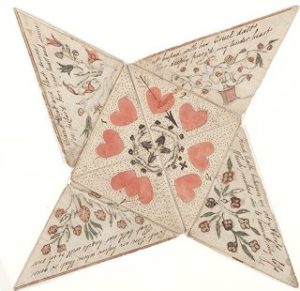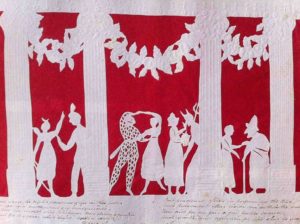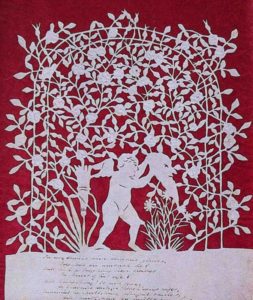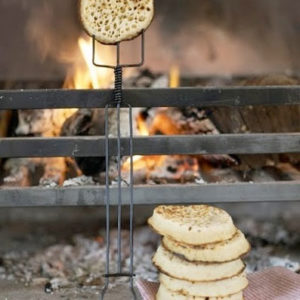
An 18th century Valentine’s card
Mr. Darcy put down his book and his face lighted as his wife entered the library. “So, you have found me,” he greeted her with a smile.
“That is not a matter of wonder. Where else would you be likely to be found, such a dark wet day as this, save the library?”
“Very true, although it leads me to observe that after three months of marriage, you are become alarmingly familiar with the predictability of my movements.”
“Alas! It is what married people come to, and you know I am a very skillful creature. But you have not attained to my abilities. You have no idea where I have been.”
“It can make little difference, Elizabeth, as I am sure you will tell me,” he replied, putting down his book and holding out his hand. She came and sat on the arm of his large, brocaded chair, before the fire.
“Yes, you know me well enough to be aware that I can deny you nothing! But I will give you another proof of my superior knowledge. I am convinced that you are in need of the novelty of a surprise, to lighten this February storm.”
“I certainly would be amenable to something of the sort,” he admitted.
“Well, then, see if you can tell me where I have been?”
“I can only conjecture. You will not have been out of doors, in this freezing rain; and many of the rooms are chilly. Let me see, you have been in the kitchens, or else in Mrs. Reynolds’ quarters.”
Elizabeth laughed delightedly. “There, I gave you a chance to prove your cleverness, and you did not fail. Yes, I have been with Mrs. Reynolds, who loves to lecture, and is a most agreeable expert on the lore of Pemberley.”
“And what branch of the subject has she instructed you in today? A cataloguer’s knowledge of the paintings, or the contents of the storerooms? Or have you been engaged in the mysteries of constructing menus?”
“All of those, at one time or another. Mrs. Reynolds and I are devoted to the same two things: the well-running of the house, and the comfort and happiness of its master; and it may be best to keep you in the dark as to the interior intricacies of these attainments.”
“In the dark – yes. How it pours, and it is almost full darkness, though not even five o’clock. We could not have our walk today – or yesterday – and I cannot be called a pessimist for expecting more of the same tomorrow. I am only afraid that you are starting to find that living in the Derbyshire countryside is a serious undertaking at this time of year.”
“No indeed,” she told him earnestly, “because it is home. And you know, winter here is not significantly worse than it was at Longbourn; and the company is much more to my taste.”
“Then I am satisfied,” he answered, with an affectionate look. “Besides, we can make our own amusements indoors, Elizabeth. As a matter of fact I was sitting here thinking we could try a new one – reading poetry.”

Elizabeth Cobbold’s invitation to a Valentine ball, 1806
“Poetry!” Elizabeth exclaimed. “I ought not to be surprised. I do remember you once saying that you thought poetry was the food of love.”
“I did say that, and you did not change my mind, despite your impertinent sally that one good sonnet would starve love entirely away.”
Elizabeth laughed. “How impudent I was! Well, the impudence served its purpose, as it proved to be the leading quality you wanted in a wife.”
“If impudence was all, it would be insufferable,” he said seriously, “but you had never had the shadow of it; and such wit and charm allied with fine character, as I had never before encountered. And now, spending a winter at Pemberley, you must see why I needed such a woman, with a lively mind, to be my best match and keep me in order.”
“And I will show how I have mended my manners, by politely asking you to read me a sonnet. Is not that very good of me? You may be assured there is no danger. My affection will not be shaken by any fourteen lines, whether the sonnet is by Shakespeare, or something you have scribbled in an idle moment on a rainy night.”
“I am glad you view the prospect of a poem with such philosophy. However, I have not been writing one, but rather thinking about today’s date. It is the fourteenth of February. Do you know what that signifies?”
She thought a moment. “Why, I do remember my younger sisters used to cut out paper hearts on that day. It is the birthday of Saint Valentine. But I am rather surprised that you should know it – it is a rather obscure fact, though I suppose you have all these great tomes about you to instruct you on such things.”
“A simple almanac can do that,” he said dryly. “But it has been pleasant reading about the saint’s feast day, and reflecting that it is my first chance to celebrate the occasion as a happily married man.”
Elizabeth slipped down into the armchair seat, close by his side, and he, moving over a little to make room, put his arm about her. “I can tell that this is going to be quite a history, and I may as well make myself comfortable to hear it,” she murmured.
“There is little to tell, Elizabeth. My lecture, unlike Mrs. Reynolds’, shall be short. No one seems to be sure who was the original Saint, but he was martyred by the Romans, and his festival has been celebrated in the Christian calendar since time out of mind. Chaucer wrote in his “Parliament of Fowls” that “Seynt Valentyne’s Day” was “Whan every byrd cometh there to choose his mate.”
“Birds? That is not a promising beginning, to say we are fowls, or does he mean fools? Surely you do not think that.”
“Far be it from me. But Chaucer’s was only one of several Valentine poems I have found, to regale you with. Here is another, that may be more to your taste. Will you hear it?”
“Certainly.”
“It is by John Donne, and it is an epithalamium – a marriage poem you know – for Elizabeth, daughter of King James I, who married on Valentine’s Day. I thought her name was a happy coincidence.”
“To be sure it is. Go ahead then. You want to read it, and I shall be delighted to hear you.”
“It continues the bird theme:
“Hayle Bishop Valentine whose day this is
All the Ayre is thy Diocese
And all the chirping Queristers
And other birds ar thy parishioners
Thou marryest every yeare
The Lyrick Lark, and the graue whispering Doue,
The Sparrow that neglects his life for loue,
The houshold bird with the redd stomacher
Thou makst the Blackbird speede as soone,
As doth the Goldfinch, or the Halcyon
The Husband Cock lookes out and soone is spedd
And meets his wife, which brings her feather-bed.
This day more cheerfully than ever shine
This day which might inflame thy selfe old Valentine.”

Elizabeth Cobbold
“Birds again,” Elizabeth said thoughtfully. “A strange poem for February, with freezing gales outside our windows, and certainly not a bird within sight or hearing.”
“No, but Valentine’s day is said to be a harbinger of spring. And the poem grows warmer. Let me skip ahead to a further stanza, that may produce a different effect. Something more bridal, just fit for the newlyweds we still are:
A Bride, before a good night could be said,
Should vanish from her cloathes, into her bed,
As Soules from bodies steale, and are not spy’d.
But now she is laid; What though shee bee?
Yet there are more delayes, For, where is he?
He comes, and passes through Spheare after Spheare.
First her sheetes, then her Armes, then any where,
Let not this day, then, but this night be thine,
Thy day was but the eve to this, O Valentine.’
“Good heaven, Mr. Darcy,” said Elizabeth, “the present darkness is not sufficient to conceal my blush!”
“Do you like it?” he asked, adding teasingly, “It has not entirely starved away your love?”
“Quite the opposite,” she confessed, “it is a most inflaming poem, as you know perfectly well. And it does have the merit of not being a sonnet.”
“I can give you a sonnet, if you want one, or I remember Shakespeare has something to say about Saint Valentine – it seems that many poets do. Ophelia’s speech, in Hamlet.”
He took from the pile of books on a pretty round marquetry table a volume of Shakespeare, and with little difficulty found the passage and handed the book to Elizabeth. “You shall read Ophelia,” he told her. With no demurral, she read:
“To-morrow is Saint Valentine’s day,
All in the morning betime,
And I a maid at your window,
To be your Valentine.
Then up he rose, and donn’d his clothes,
And dupp’d the chamber-door.
Let in the maid, that out a maid
Never departed more.”
“Most of these Valentine poems seem to be about disrobing,” she observed tartly, handing back the book.
“I hope I have not offended you, my dear.”
“You could not. And I will go so far as to admit that this poetry reading does pass an afternoon most pleasantly.”
“I think so. And as Donne says, ‘The day is but the eve to this, O Valentine.’ The night will be all ours, yours and mine. But there is no need to be in haste, even for our joys.”
Elizabeth’s dark eyes laughed at him. “I like your deliberation. So you think that five o’clock is perhaps a more suitable time for tea, than for Valentine transports, do you?”
He hugged her warmly. “I do,” he answered. “After all, we have world enough and time, for every thing.”
“And that is from a poem, too, if I mistake not.”
“So many familiar sayings are. ‘To His Coy Mistress. Andrew Marvell:
“Well, to more cheerful matters, I happen to know that at the stroke of five, Mrs. Reynolds is going to bring us some crumpets to toast at the fire. We shall do the work for ourselves, with a toasting-fork, and then devour them with lashings of butter, for our tea.”
“The very thing!” Darcy exclaimed. “You have a most remarkable way of knowing exactly what I want before I do myself. ”
“I suppose such a meal has never been seen before at Pemberley?” she asked mischievously. “Tea is usually such an elegant ceremony here.”
“True enough. But many things new are being seen beneath this roof, brought to me by you, my dearest Elizabeth, and I rejoice in them all.”
“Then who gives a fig for winds and storms!” She laid her cheek against his, and they were unaware of time, until there was a discreet rapping on the door.
“Oh!” exclaimed Elizabeth. “Here come the crumpets!”

It seemed appropriate to finish this story with crumpets, because Jane Austen herself liked to write about a crumpet, or at least hot buttered toast. In Sanditon, she has her character Arthur Parker very fond of making toast, which he does to impress heroine Charlotte.
“Turning completely to the Fire, he sat coddling and cooking it to his own satisfaction and toasting some Slices of Bread, brought up ready prepared in the Toast rack–and till it was all done, she heard nothing of his voice but the murmuring of a few broken sentences of self-approbation and success.— When his toils were over however, he moved back his Chair into as gallant a line as ever.
‘I hope you will eat some of this toast,” said he. “I reckon myself a very good toaster. I never burn my toasts, I never put them too near the fire at first. And yet, you see, there is not a corner but what is well browned. I hope you like dry toast.’
‘With a reasonable quantity of butter spread over it, very much,” said Charlotte, ‘but not otherwise.’
‘No more do I,” said he, exceedingly pleased. “We think quite alike there.’”

13 comments
Skip to comment form
Three months in and so right together. I love this, thank you!
Warm fire, teases, poetry, anticipation, shared cozy comfy chair, buttered crumpets and Darcy…
The very thing indeed❤️
Author
I’m so glad you liked this, Deborah – with coziness and other pleasant sensations, I thought crumpets were indeed in order!
Thank you for sharing. Happy Valentine’s Day to all.
Author
And Happy Valentine’s Day to you, Sheila. Nice to think about Darcy and Elizabeth on that day (or any day), isn’t it?
Happy Valentine’s. Thanks for sharing.
Author
Thanks for reading, J.W., and Happy Valentine’s Day to you.
What a beautiful excerpt!
Happy Valentine’s Day, indeed!
Author
Delighted you liked it! Wishing you a happy Valentine’s Day, too, Denise.
Thank you, Diana. Very enjoyable.–Gracia Fay
Author
Hi Gracia Fay, good to “see” you! Happy Valentine’s Day and I’m so pleased you enjoyed this. xx
That was a fun yet informative reading with the references to poets! Thank you for sharing this!
Author
Thanks for commenting, Jen – Darcy and Elizabeth do talk about poetry in Pride and Prejudice, so I thought I’d follow that up. I’m glad you enjoyed it!
I had no idea Valentine’s day was celebrated so long ago, thanks for the clever banter with a bonus history lesson.